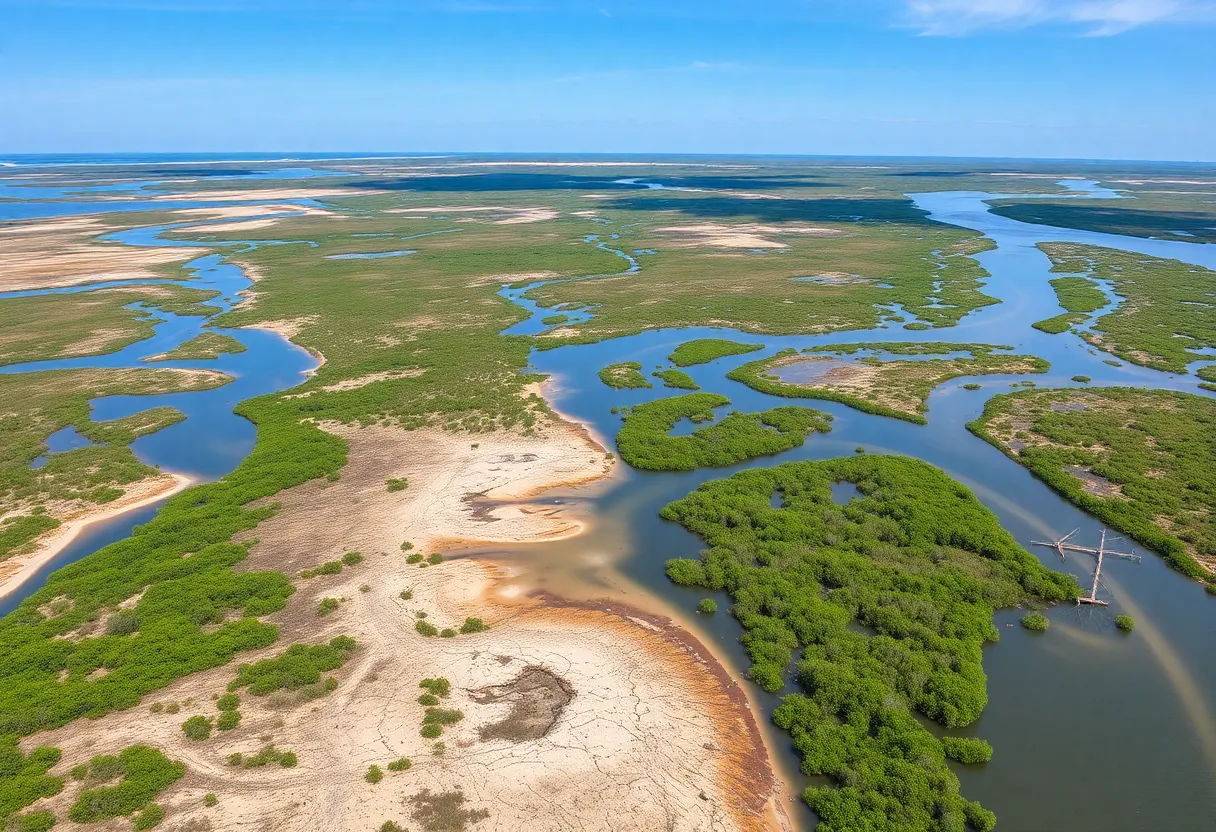News Summary
Louisiana has canceled the $3 billion Mid-Barataria Sediment Diversion Project aimed at combating coastal land loss. Governor Jeff Landry’s decision has sparked controversy among conservationists and community leaders, raising concerns over the future of coastal restoration efforts in the state. The cancellation not only undermines a crucial part of Louisiana’s Coastal Master Plan but also poses significant financial implications and potential impacts on local ecosystems.
New Orleans — Louisiana has officially canceled the $3 billion Mid-Barataria Sediment Diversion Project, a critical initiative aimed at combatting severe coastal land loss in southeastern Louisiana. The decision, announced by Governor Jeff Landry, has sparked significant controversy regarding the state’s ongoing coastal restoration efforts.
The Mid-Barataria project, which was funded through the 2010 Deepwater Horizon oil spill settlement, was central to Louisiana’s Coastal Master Plan. It aimed to combat the alarming loss of land, with projections indicating that the state was losing approximately one football field of land every 100 minutes. Over the past century, more than 2,000 square miles of Louisiana’s coastline have been lost, largely attributed to climate change and ongoing sediment deprivation caused by the levee system.
Conservationists hailed the Mid-Barataria project as a scientifically backed approach to restore wetlands by diverting sediment-laden water from the Mississippi River. This sediment diversion was expected to create over 20 square miles of land over a 50-year timeline. However, the project faced considerable opposition from Governor Landry, who viewed it as a potential threat to the state’s traditional practices, particularly in fisheries and the oyster industry. He expressed concerns that the planned influx of freshwater might adversely affect local ecosystems and cultural practices tied to shrimp and oyster harvesting.
Significant financial implications arise as a result of the cancellation, as Louisiana stands to lose over $1.5 billion in allocated funds intended for the project. Additionally, the state may be required to repay $618 million that had already been disbursed for construction purposes. The Louisiana Trustee Implementation Group, which oversees the allocation of Deepwater Horizon settlement funds, has indicated that funds could be redirected to future restoration efforts but will need thorough review and approval.
Legal challenges have also plagued the project, contributing to delays in construction. Warnings about the reimbursement of previously spent funds were noted, given the lack of project progress. In light of these hurdles, the Coastal Protection and Restoration Authority (CPRA) determined that continuing with the Mid-Barataria project was no longer financially viable, citing increased costs, permitting issues, and ongoing litigation.
The cancellation drew sharp criticisms from numerous stakeholders, including former Louisiana Representative Garret Graves. He described the decision as a “boneheaded” move that lacked scientific rigor and suggested it could lead to severe setbacks in the fight against coastal erosion. Environmental groups and organizations like the Restore the Mississippi River Delta coalition labeled the cancellation as a retreat from evidence-based planning and engagement vital to coastal protection.
Community leaders expressed alarm over the potential displacement of residents if no significant action is taken to restore the coast. The absence of proactive measures could leave many vulnerable to the repercussions of continuous land loss and environmental degradation.
In response to the cancellation, Governor Landry announced a pivot towards a smaller-scale diversion project. The new plan seeks to explore alternatives such as the Louisiana Coastal Area (LCA) Medium Diversion Myrtle Grove project, which promises to yield similar restoration benefits. Monthly updates regarding the closure of the Mid-Barataria project will be mandated by the Louisiana Restoration Area Trustees as funds are redirected for alternative initiatives.
Overall, the decision to cancel the Mid-Barataria Sediment Diversion Project underscores the ongoing clash between conservation goals and local economic interests, raising critical questions about the future of coastal restoration efforts in Louisiana.
Deeper Dive: News & Info About This Topic
- WDSU
- Wikipedia: Coastal Restoration
- YourSun
- Google Search: Louisiana coastal restoration
- Washington Post
- Google Scholar: Louisiana coastal erosion
- Shreveport Times
- Encyclopedia Britannica: Louisiana coastal protection
- Louisiana Illuminator
- Google News: Mid-Barataria project cancellation

Author: STAFF HERE NEWORLEANS WRITER
The NEW ORLEANS STAFF WRITER represents the experienced team at HERENewOrleans.com, your go-to source for actionable local news and information in New Orleans, Orleans Parish, and beyond. Specializing in "news you can use," we cover essential topics like product reviews for personal and business needs, local business directories, politics, real estate trends, neighborhood insights, and state news affecting the area—with deep expertise drawn from years of dedicated reporting and strong community input, including local press releases and business updates. We deliver top reporting on high-value events such as French Quarter Festival, New Orleans Jazz & Heritage Festival, and Essence Music Festival. Our coverage extends to key organizations like the New Orleans Chamber of Commerce and Greater New Orleans, Inc., plus leading businesses in energy, healthcare, and education that power the local economy such as Entergy, Ochsner Health, and Tulane University. As part of the broader HERE network, including HEREShreveport.com, we provide comprehensive, credible insights into Louisiana's dynamic landscape.

